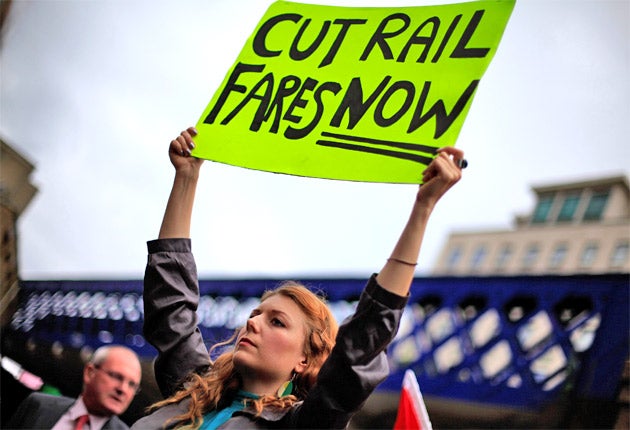Age of the pain as commuters face 8 per cent rise in ticket prices

Your support helps us to tell the story
From reproductive rights to climate change to Big Tech, The Independent is on the ground when the story is developing. Whether it's investigating the financials of Elon Musk's pro-Trump PAC or producing our latest documentary, 'The A Word', which shines a light on the American women fighting for reproductive rights, we know how important it is to parse out the facts from the messaging.
At such a critical moment in US history, we need reporters on the ground. Your donation allows us to keep sending journalists to speak to both sides of the story.
The Independent is trusted by Americans across the entire political spectrum. And unlike many other quality news outlets, we choose not to lock Americans out of our reporting and analysis with paywalls. We believe quality journalism should be available to everyone, paid for by those who can afford it.
Your support makes all the difference.Rail passengers are set to see ticket-price rises of around 8 per cent after an increase in the amount operators can raise fares over the rate of inflation came into effect. The changes mean that a monthly season ticket between Oxford and London is likely to increase by £31.52 to £425.52 per month.
Click HERE to view graphic (178k jpg)
The Government announced in last year's Spending Review that its formula for calculating regulated fares such as season tickets will allow for price increases of 3 per cent over each July's Retail Price Index (RPI) figure for the next three years. The previous formula allowed for price increases of 1 per cent over RPI.
Office for National Statistics figures released yesterday showed no change in the index, which remains at 5 per cent. And flexibility within the regulations means some operators can charge even more on some routes, provided their average rises do not exceed the new guideline figure of 8 per cent.
A protest against the fare increases took place outside Waterloo Station in London yesterday as part of the Campaign for Better Transport's "Fair Fares Now" campaign. The group has also started a petition demanding the scrapping of "above inflation fare hikes".
Alexandra Woodsworth, Campaign for Better Transport's public transport campaigner, called the fare rises "punitive" and said they would "deal a fresh blow to commuters already facing the financial crunch of rising costs combined with frozen wages".
She said: "We need affordable rail travel, not only to give passengers a fair deal, but to protect the economic health of our major cities and to address the urgent imperative to cut carbon emissions." She said the protesters wanted to send a "clear message" to the Government that it is "time to burst the bubble on inflation-busting fare hikes". Transport Secretary Philip Hammond admitted the decision to introduce the higher rate of fare rises "has not been popular". But he added: "We are now embarked on one of the biggest programmes of rail investment for 100 years, delivering more than 2,700 new rail carriages, a £900m programme to electrify more lines and the vital Crossrail and Thameslink projects in London. Due to the scale of the deficit, these investments would simply have not been possible without the difficult decision to increase rail fares."
The increases will take effect in January and remain in place for 12 months, changing only with the fluctuation in the July RPI readings, the calculation of the price of goods and services in the UK, over the next three years.
The Scottish government has stuck to the smaller annual increase of 1 per cent over RPI. A decision has not yet been taken by the Welsh Assembly.
Bob Crow, general secretary of the National Union of Rail, Maritime and Transport Workers, said: "These hikes are part of the wider agenda to put profit before people and to make passengers and rail workers pay to maintain the profits of the private operators."
Join our commenting forum
Join thought-provoking conversations, follow other Independent readers and see their replies
Comments